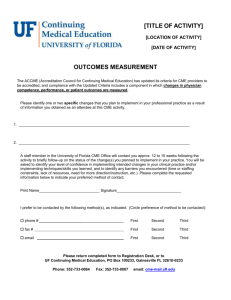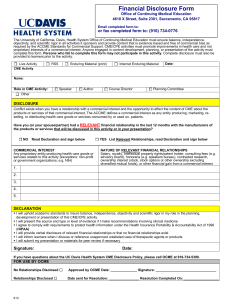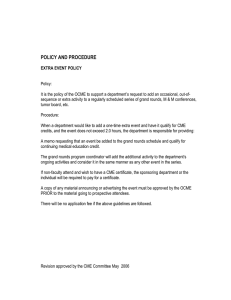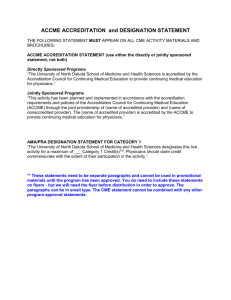UCDHS CONTINUING MEDICAL EDUCATION POLICY ACTIVITY CHAIR RESPONSIBILITIES Policy 1.8
advertisement
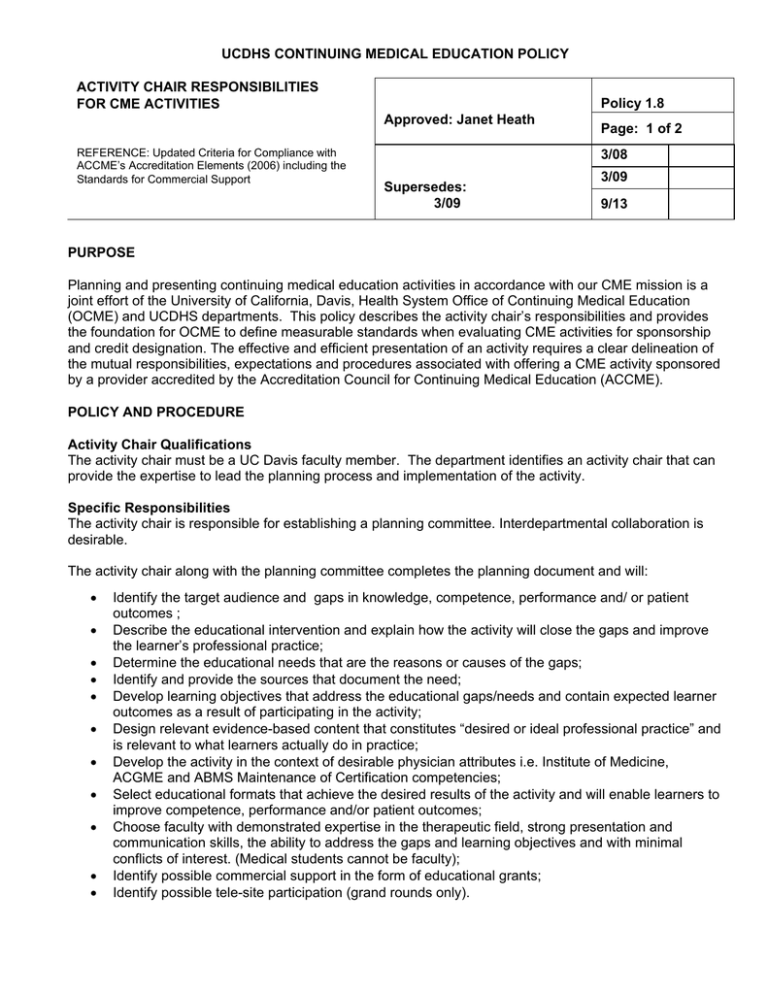
UCDHS CONTINUING MEDICAL EDUCATION POLICY ACTIVITY CHAIR RESPONSIBILITIES FOR CME ACTIVITIES Policy 1.8 Approved: Janet Heath REFERENCE: Updated Criteria for Compliance with ACCME’s Accreditation Elements (2006) including the Standards for Commercial Support Page: 1 of 2 3/08 Supersedes: 3/09 3/09 9/13 PURPOSE Planning and presenting continuing medical education activities in accordance with our CME mission is a joint effort of the University of California, Davis, Health System Office of Continuing Medical Education (OCME) and UCDHS departments. This policy describes the activity chair’s responsibilities and provides the foundation for OCME to define measurable standards when evaluating CME activities for sponsorship and credit designation. The effective and efficient presentation of an activity requires a clear delineation of the mutual responsibilities, expectations and procedures associated with offering a CME activity sponsored by a provider accredited by the Accreditation Council for Continuing Medical Education (ACCME). POLICY AND PROCEDURE Activity Chair Qualifications The activity chair must be a UC Davis faculty member. The department identifies an activity chair that can provide the expertise to lead the planning process and implementation of the activity. Specific Responsibilities The activity chair is responsible for establishing a planning committee. Interdepartmental collaboration is desirable. The activity chair along with the planning committee completes the planning document and will: Identify the target audience and gaps in knowledge, competence, performance and/ or patient outcomes ; Describe the educational intervention and explain how the activity will close the gaps and improve the learner’s professional practice; Determine the educational needs that are the reasons or causes of the gaps; Identify and provide the sources that document the need; Develop learning objectives that address the educational gaps/needs and contain expected learner outcomes as a result of participating in the activity; Design relevant evidence-based content that constitutes “desired or ideal professional practice” and is relevant to what learners actually do in practice; Develop the activity in the context of desirable physician attributes i.e. Institute of Medicine, ACGME and ABMS Maintenance of Certification competencies; Select educational formats that achieve the desired results of the activity and will enable learners to improve competence, performance and/or patient outcomes; Choose faculty with demonstrated expertise in the therapeutic field, strong presentation and communication skills, the ability to address the gaps and learning objectives and with minimal conflicts of interest. (Medical students cannot be faculty); Identify possible commercial support in the form of educational grants; Identify possible tele-site participation (grand rounds only). UCDHS CONTINUING MEDICAL EDUCATION GUIDELINES ACTIVITY CHAIR RESPONSIBILITIES FOR CME ACTIVITIES Policy 1.8 Approved: Janet Heath REFERENCE: Updated Criteria for Compliance with ACCME’s Accreditation Elements (2006) including the Standards for Commercial Support Page: 2 of 2 3/08 Supersedes: 3/09 3/09 9/13 In addition to the CME application, the activity chair is responsible for: Approving the activity budget and ensuring that proposed honoraria payments, travel reimbursement and receipt of commercial support adheres to UC accounting policies and ACCME Standards for Commercial Support; Ensuring that the activity and all persons involved with the planning and implementation of the activity adhere to all UC Davis and UC Davis Health System policies including the University of California Ethical Values and Conduct policy; Ensuring that everyone in a position to control content adheres to UC and OCME policies on financial disclosure and submits a disclosure of relevant financial relationships form; this includes activity chairs, planning committee members, speakers, authors, content reviewers, etc; Properly resolving conflicts of interest prior to the activity should they exist; Ensuring that all faculty disclosures and acknowledgements of commercial support are made to the learners prior to the activity; Ensuring that all content in the activity conforms to the ACCME Clinical Content Validation Statements; Coordinating individual presentations to ensure that they complement each other and content will not be repetitive; Reviewing (or assigning to a designated independent reviewer) all course content to ensure that presentations are consistent with the CME Mission, ACCME Criteria and meet UCD standards concerning copyright materials; Submitting activity materials in accordance with deadlines established in the activity chair agreement letter; Notifying and submitting to OCME all grant monies received to support the activity; o Commercial support in the form of educational grants must be managed by the OCME. Letters of Agreement must be received for every grant and funds deposited by the OCME. Post activity reconciliation reports must be completed per grantor requirements and funds may have to be returned to the grantor if income exceeds course expenses. Participating in a post-activity fiscal reconciliation and evaluation review; Signing, along with the department chair, the OCME accreditation and financial agreement for all CME activities. In signing these agreements, the activity chair and department chair agree to adhere to the ACCME Criteria and Standards for Commercial Support. Reviewed, updated and approved by OCME, 9/2013
